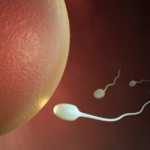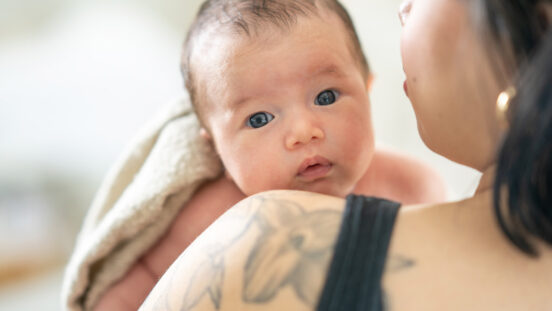Pregnancy changes to your body: A week by week guide
Pregnancy will change almost every part of your body, top to toe, here's how.
Pregnancy is a unique stage of a woman's life. Your body undergoes amazing changes from week to week and even from day to day, so it's important to maintain a good diet and include low-impact exercise in your daily routine.
However, hormones will take over your body – one day you might be teary and suffering [morning sickness](http://www.nowtolove.com.au/preview/parenting/pregnancy-birth/morning-sickness-remedies-18345 |target="_blank"), and the next you'll be glowing with vitality. Just remember the changes you experience are all part of the exciting journey to becoming a family.
Week by week
While the experience of pregnancy differs vastly from woman to woman and from one pregnancy to the next, here's an idea of the changes that are likely to occur over the 40 weeks.
First trimester
Weeks 0-6 The countdown on the 40-week pregnancy term starts from the first day of your last period, and health professionals estimate conception occurs in the third week. There's no immediate sign you're pregnant, but you may notice spotting from the embryo attaching itself to your womb. In the fourth week, a mucous plug forms in the cervix to seal the womb against infection.
Weeks 7-8 Your breasts become tender with the areolae darkening and getting bigger. Bluish veins are visible as the blood supply increases. Your blood pressure is lower than usual, so you may feel dizzy or faint. Your uterus is still smaller than a tennis ball, but it will begin to change from pear to apple-shaped, and you may feel cramping.
Weeks 9-11 Pregnancy hormones flood your system and the volume of blood in your body increases. This may improve your skin, but could also soften your gums. The thyroid gland in your neck may be more prominent.
Week 12 Your uterus is too large to remain in your pelvis so it starts to push out above your pelvic bone. Your heart is pumping extra blood around your body and your temperature rises – this is the cause of that 'pregnancy glow'.
Week 13 The hormones in your ovaries no longer maintain the pregnancy; your placenta now takes over. You may start to notice a small bump as your uterus moves up into your abdomen.
Second trimester
Weeks 14-15 Your uterus is now the size of a large grapefruit. Your skin is more pigmented and you may notice a dark line (the linea nigra) running down the centre of your abdomen. For most women, the nausea will have disappeared by now. You may develop a facial pigmentation known as chloasma that will fade after your baby is born.
Weeks 16-19 The amount of amniotic fluid and the size of your uterus are increasing. You may feel a fluttering in your stomach, which is the baby moving, but don't worry if you can't – it's still early days. Your bump is showing more, your waistline will probably have disappeared and your uterus is about the size of a rockmelon. It's around now, as your abdomen expands, that your navel flattens and 'pops out'.
Weeks 20-21 You'll probably be feeling your baby move and may be able see your tummy move. Your skin might itch as it stretches, and the top of your uterus expands to become parallel with your belly button.
Weeks 22-24 You'll notice tiny dilated blood vessels like spider veins on your face, arms and shoulders – don't worry, they're harmless. You've gained between four and seven kilos in weight and feel quite heavy. The top of the uterus reaches above your navel. You might start having Braxton Hicks – or 'practice' – contractions that pump blood to the uterus and prepare your body for labour.
Weeks 25-26 Your uterus is the size of a football and you may start to get cramps. Stretch marks can appear at any time, though it's common for them to show up around now. You'll feel strong kicks from your baby. The top of your uterus is now between your belly button and rib cage.
Third trimester
Weeks 27-28 You're [gaining weight](http://www.nowtolove.com.au/parenting/pregnancy-birth/pregnancy-bump-small-18330 |target="_blank") and will continue to do so until about week 39. Your abdomen feels hard, but your breasts feel tender and may leak colostrum, a prelude to milk.
Weeks 29-30 Your heart is now working one and a quarter times harder than before pregnancy, as your blood volume has increased by over two litres. Your uterus is well above your belly button. Hormones have loosened your ligaments – you may have pains at the top of your legs from ligaments stretching – so try to maintain good posture.
Weeks 31-32 You may feel you're bonding with your baby through his movements. You often feel breathless after physical activity. The baby is filling your abdomen, shifting your bump upwards towards your breasts and pressing on your diaphragm.
Weeks 33-34 You're gaining weight faster than at any other time over the course of your pregnancy because the baby is growing so rapidly. Your blood volume has increased by 40 percent to meet the growing needs of your baby, uterus and placenta. You may notice the shape of your abdomen changes as your baby starts to drop down.
Weeks 35-36 Your back may ache as the muscles supporting the joints start to relax. Your bump settles lower down, making it easier to breathe.
Weeks 37-38 You feel uncomfortable and may notice a strange feeling
in your vagina as the baby's head moves against your pelvic floor.
Weeks 39-40 Your weight stabilises. Your cervix softens and begins to partially open. Braxton Hicks contractions may begin. Your baby's birth is near, but as only 5 pecent of babies arrive on their due date, be prepared.
What's happening to my body?
Pregnancy will change almost every part of your body, inside and out, top to toe. These are the most obvious physical transformations that you are likely to notice.
Breasts
Your weight and breast size will increase the most in the first trimester, which is the time to get fitted for a new bra. It's important to be fitted professionally as your cup size can increase by up to two sizes in the first weeks. At least a month before the birth you'll need to be fitted for a nursing bra that can support your breasts during lactation.
The reason your breasts grow during pregnancy is because the thousands of tiny milk glands inside them begin to enlarge and small ducts form a conduit to the nipple.
As a result, it is not recommended that you wear feeding bras with underwire as they can cause discomfort and could potentially place pressure on your milk ducts, leading to blockages.
Nails
If you've always had strong, shiny nails you may be disappointed to find them becoming brittle and splitting easily now. There's not much you can do about weakened nails except look after them and keep them short.
Skin
Your skin may be drier or more oily than usual. Many women suffer acne-like breakouts, particularly in the first trimester, that usually settle down. Your skin's pigmentation may change, due to increased melanin. To prevent or reduce the chances of chloasma occurring at around 14 to 15 weeks, it's important you keep out of the sun and always apply high-SPF sunscreen or wear protective clothing when exposed.
Around 50 percent of women will get stretch marks, usually on the belly. They may also appear on breasts, buttocks, hips and thighs. There's no guaranteed way of getting rid of them (though creams containing vitamin E can help), but they will fade once your baby is born.
About a quarter of women experience itchy skin, which can be because it's stretching. If your skin is unbearably itchy, see your GP – it might be the sign of a more serious condition called obstetric cholestasis.
Sleep
It's most important when you are pregnant to get plenty of rest. Having an afternoon nap may not be realistic if you're at work, but try to go to bed earlier – especially in the first trimester.
Pressure on your bladder and overheating are common causes of sleeplessness, so get into the routine of not drinking for a few hours before bedtime, and ventilating the bedroom.
You may find it difficult to get comfortable as your belly gets bigger. Try to avoid lying on your back, as the weight of the baby can put pressure on major blood vessels. Instead, try sleeping on your left side with a pillow between your legs and another under your bump.
Continues after video …
Teeth
Dental care is especially important during pregnancy. High progesterone levels make the margins of the gums around teeth soft and spongy, predisposing them to infection.
As well as being scrupulous about brushing and flossing regularly, dental check-ups are essential during pregnancy. Research has shown that pregnant women with gum disease have a significantly higher risk of miscarriage and premature birth. Fortunately, gum disease can easily be prevented with good oral hygiene and regular check-ups.
Emotional changes
As well as the physical changes your body is going through, you'll also experience major emotional changes. Even if you've never suffered from PMT or mood swings before, you may find you're sobbing at a television commercial one minute and laughing hysterically the next. Or you may feel ambivalent about motherhood, which is also perfectly normal.
This upheaval isn't surprising, as you have eight potentially mood-altering hormones surging around your body: adrenaline, endorphins, oestrogen, progesterone, oxytocin, prolactin, prostaglandin and relaxin.
In addition, there's the mental preparation you have to go through in anticipation of your new baby's arrival. It may have been just you and your partner for a long time – but now you're about to be joined by a third person. While you might feel more emotional, discussing future plans for your family and preparing the home for your new arrival will add to the excitement about the changes ahead. Sharing your hopes and fears for your little one will also bring you closer.
You may feel lethargic, unfit and unattractive, and lose a bit of confidence. This is quite normal, but remember, your body is achieving amazing things right now – it's growing another human – so don't feel guilty if you're snappy or tearful. You can't control your hormones.
Your partner
Your partner is probably as excited, scared and in awe as you are, even though he isn't actually growing the baby. Many mums-to-be become so focused on their body and baby they can easily forget about their partners, leaving them feeling slightly left out.
Make an effort to include your partner throughout the pregnancy as much as possible – he'll be as excited as you are by your ultrasound screenings. Signing up for antenatal classes together will also help both of you to bond over this new experience.
If you can, take a holiday or even just get away for a romantic weekend while you're pregnant. Many hotels now offer special 'babymoon' deals for parents-to-be, so why not take advantage of them?
Mane event
Hormonal changes mean more than 90% of the hair on your head will go into a growing phase, making it thicker and stronger.
After passing that difficult first trimester, when many women experience more oily hair, it really can become your crowning glory.
For women who like to colour their hair, there's no evidence suggesting that dyeing must be avoided during pregnancy. If you're concerned, save it for the second trimester onwards.
Antenatal depression
It's normal to be more weepy than usual when you're a mum-to-be, but about one in 10 pregnant women can't get off the emotional roller-coaster and are diagnosed with antenatal depression (not to be confused with postnatal depression). If you're very anxious, have been feeling depressed for more than a few weeks or just concerned about how you're feeling, it's vital you speak to your doctor or midwife. You're not alone and it can be treated.




